|
|
|
Sort Order |
|
|
|
Items / Page
|
|
|
|
|
|
|
| Srl | Item |
| 1 |
ID:
120300
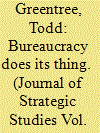

|
|
|
|
|
| Publication |
2013.
|
| Summary/Abstract |
It is not too soon to draw cautionary lessons from the inconclusive results of US performance during more than 11 years of Operation 'Enduring Freedom' in Afghanistan. As in Vietnam, fundamental difficulties persist in adapting enduring institutions to the requirements of strategy. At the heart of the matter is tension between the assumptions that underlie counterinsurgency as practiced in Afghanistan and organization of the US Armed Forces, State Department, and Agency for International Development. Knowledge of basic principles and necessary changes is available to answer the question, could the US have done better?
|
|
|
|
|
|
|
|
|
|
|
|
|
|
|
|
| 2 |
ID:
117048
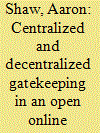

|
|
|
|
|
| Publication |
2012.
|
| Summary/Abstract |
This paper presents a study of gatekeeping in the U.S. political blog "Daily Kos." Open online collectives like Daily Kos use relational mechanisms, such as gatekeeping, to manage organizational boundaries and filter the contributions of participants. However, neither prior theories of gatekeeping nor the existing analyses of open online collectives account for the character or implications of gatekeeping in the Daily Kos community. Using qualitative evidence as well as statistical analysis of a large sample of comment threads on the site from 2008, I argue that gatekeeping on Daily Kos takes centralized and decentralized forms, and that both modes depend critically on relational boundary work among site participants. Centralized gatekeeping proceeds through actions by high-status members of the community. Decentralized gatekeeping, by contrast, consists of more numerous and small-scale interactions between community members, who filter and moderate each other's participation. Both forms of gatekeeping enhance the ability of site leaders and incumbent community members to regulate access to privileges and agenda-setting responsibilities on the site. These findings imply that the egalitarian ethos of open online collectives exists in tension with the mechanisms through which participation and status inequalities emerge among participants. How collectives engaged in mobilization and discursive production resolve this tension will shape the long-term impact of online participation and blogs on the political and public spheres.
|
|
|
|
|
|
|
|
|
|
|
|
|
|
|
|
| 3 |
ID:
188282
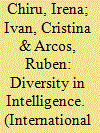

|
|
|
|
|
| Summary/Abstract |
With the advent of new technologies and the accelerated changes in the security arena, it has become apparent that intelligence organizations need to develop learning, self-reflective, and competitive working environments and communities of practice with a distinct set of values and norms that may go beyond the cultural values and practices of the twentieth century. One of the values that needs to be further explored and integrated is diversity. A look at the literature and policies in the field shows that in certain parts of the world, consistent steps have been made toward investigating the implications of diversity and inclusion as setting goals for reconceptualizing human resources and internal culture strategies. This introductory study aims to introduce readers to the current debates on diversity and inclusion, as well as offer a short glimpse at the question.
|
|
|
|
|
|
|
|
|
|
|
|
|
|
|
|
| 4 |
ID:
168300
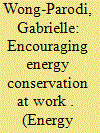

|
|
|
|
|
| Summary/Abstract |
The financial cost of personal energy consumption is substantial at the organizational level. Rarely do incentives for saving energy for the individual employee and organization align, making conservation a challenge. Here we perform a 12-week field experiment piloting two behavioral strategies: (1) social norms feedback and (2) awareness of energy monitoring, to encourage savings among 46 administrative staff at a university who were given the impression of participating in an energy quality study to reduce self-selection bias. Those in the social norms feedback condition used significantly less energy during the intervention (10% less energy) and follow up monitoring (11% less energy) phases compared to their baseline consumption. Moreover, these participants demonstrated that they learned more about their energy use than did those in the awareness monitoring condition. For policy makers and building mangers interested in the effectiveness of behavioral nudges in inducing energy savings, social norms feedback appears to be an effective energy savings nudge in an organizational setting where there are neither financial savings at-stake nor intrinsic motivation to conserve.
|
|
|
|
|
|
|
|
|
|
|
|
|
|
|
|
| 5 |
ID:
141724
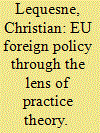

|
|
|
|
|
| Summary/Abstract |
There is a proliferation of works on the new European External Action Service (EEAS). Most of these approach the EEAS through a rationalist framework, assessing how a new institution can solve long-term questions of EU foreign policy-making to ensure consistency and coherence while reducing transaction costs between actors (both supranational and national) in a multilevel governance structure. This paper takes a different direction. Using 30 interviews with officials from the EEAS, the European Commission, and national ministries of foreign affairs, conducted between 2010 and 2013, it shows how the study of practice aids understanding of the nature of the EEAS. As a new institution, the EEAS lends itself particularly well to practice-based study because new institutions must develop new practices.
The first section of the article defines the notion of practice and shows the importance of historicizing the struggles around practices in understanding the creation of the EEAS. The second section demonstrates how agents’ practices shape professional cultures within the EEAS. The third section highlights the relationship between practices and rule-making. Going over the EEAS as a case study, the conclusion focuses on the importance of analysing actors’ practices for understanding the current evolution of diplomacy and international relations in general.
|
|
|
|
|
|
|
|
|
|
|
|
|
|
|
|
| 6 |
ID:
130545
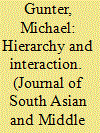

|
|
|
|
|
| Publication |
2014.
|
| Summary/Abstract |
More than 30 years after it was founded as a small, violent, and isolated Kurdish party advocating Marxist revolution and the creation of a pan-Kurdish state, the Kurdistan workers Party (Partiyzz Karkaren Kurdistan) or PKK has both spawned and/or inspired a plethora of Kurdish nationalist organizations in Turkey. The rise of Kurdish nationalism, demands for Kurdish constitutional and legal rights, and need to establish new organizational names and identities to substitute for that of the
"terro1ist"-designated PKK help explain this Kurdish organizational proliferation. To the extent that the PKK has ignited Kurdish democratic self-determination, this article will analyze the broadly-based, complementary dynamics ol the various Kurdish nationalist groups in Turkey created over the years by the PKK (KCK]. VV hat are its components? Why were they created? How do they interact with each other? How successful has this movement been? Specifically analyzed are the PKK, KCK, BDP and the DTK in Turkey; and in the European diaspora, KON-KURD, KGK, KNK, EUTCC, Pl K, and CAMPACC, among others. The tentative conclusion is that this Kurdish movement has enjoyed enough success to promise an eventual solution to the long-simmering Kurdish problem in Turkey along the lines of democratic autonomy or democratic self-determination and thus will be fair to all parties.
|
|
|
|
|
|
|
|
|
|
|
|
|
|
|
|
| 7 |
ID:
183016
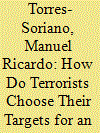

|
|
|
|
|
| Summary/Abstract |
The present article aims to further our understanding of the process whereby terrorists choose targets for attacks. It offers a case study based on information from a jihadist cell broken up by police in the province of Barcelona, Spain in April 2015 in Operation Caronte. Based on detailed analysis of conversations between cell members, obtained thanks to infiltration by an undercover police officer, it argues that the terrorist brainstorming was informed by four main factors: organizational, contextual, logistical, and geographical. The materialization of the desire to use violence in an attack plan was the dynamic outcome of the way these factors modulated the will of the terrorists.
|
|
|
|
|
|
|
|
|
|
|
|
|
|
|
|
| 8 |
ID:
188049
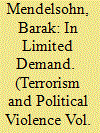

|
|
|
|
|
| Summary/Abstract |
The wars in Syria and Iraq attracted about 45,000 individuals from outside the arenas. Most joined the Islamic State, but interestingly, other prominent armed groups showed less interest in foreign volunteers. This paper introduces the Demand for Foreign Volunteers Theory (DFVT) to explain the diverging choices Jabhat al-Nusra, Ahrar al-Sham, and the People’s Protection Units made. The theory links four variables that shape groups’ positions: political considerations, operational needs, organizational capacity, and ideational fit. Both operational and political considerations emphasize the motivation for using foreign volunteers, though the two are not equally important; when they conflict, political considerations take priority. Organizational capacity, on the other hand, determines a group’s ability to translate need into action, serving as a necessary—but insufficient—condition for foreign mobilization. Finally, ideational factors, specifically a group’s identity and ideology, determine the pool of potential recruits. The case studies show that political considerations made all three actors cautious about recruiting foreign fighters, though these considerations differed between groups. Ultimately, despite the availability of sufficient organizational capacity, all groups found it risky and even undesirable
|
|
|
|
|
|
|
|
|
|
|
|
|
|
|
|
| 9 |
ID:
185195
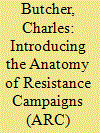

|
|
|
|
|
| Summary/Abstract |
We introduce the Anatomy of Resistance Campaigns (ARC) dataset, which records information on 1,426 organizations that participated in events of maximalist violent and nonviolent contention in Africa from 1990 to 2015. The ARC dataset contains 17 variables covering organization-level features such as type, age, leadership, goals, and interorganizational alliances. These data facilitate new measurements of key concepts in the study of contentious politics, such as the social and ideological diversity of resistance episodes, in addition to measures of network centralization and fragmentation. The ARC dataset helps resolve existing debates in the field and opens new avenues of inquiry.
|
|
|
|
|
|
|
|
|
|
|
|
|
|
|
|
| 10 |
ID:
181158
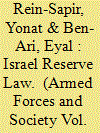

|
|
|
|
|
| Summary/Abstract |
Enacted in 2008, 60 years after Israel Defense Forces was established, the Israeli Reserves Law is a striking expression of the decline of military autonomy in a democratic country. While not aimed at reducing the military’s discretion in regard to the training, deployment, and compensation for reservists, the formal enactment of the Law in effect did so. The legislative process was preceded by a crisis between reservists and the military and was led by several reservists’ organizations who tried to improve the standing and resources allocated to the reserve forces. The article analyzes the impact of these organizations and the coalitions they created with politicians serving in the national parliament, the Knesset. By choosing the legislative option to improve the conditions of service for reservists, they de facto reduced military autonomy since the new Law mandated supervision and monitoring (by civilian institutions) of the service of reservists and extended into the core area of military action, the operational use of force. Thus, the actions of reservists’ organizations turned a bilateral tie between the military and its (reserve) soldiers into a trilateral one, comprising the military, reserve soldiers, and state institutions.
|
|
|
|
|
|
|
|
|
|
|
|
|
|
|
|
| 11 |
ID:
042446
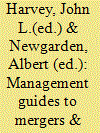

|
|
|
|
|
| Publication |
New York, Wiley-Interscience, 1969.
|
| Description |
xii, 319p.Hbk
|
| Standard Number |
471357987
|
|
|
|
|
|
|
|
|
|
|
|
Copies: C:1/I:0,R:0,Q:0
Circulation
| Accession# | Call# | Current Location | Status | Policy | Location |
| 004243 | 658.401/HAR 004243 | Main | On Shelf | General | |
|
|
|
|
| 12 |
ID:
032740
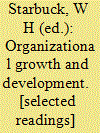

|
|
|
|
|
| Publication |
Harmondsworth, Penguin Books Ltd, 1971.
|
| Description |
383p.
|
| Series |
Penguin modern management readings
|
|
|
|
|
|
|
|
|
|
|
|
Copies: C:1/I:0,R:0,Q:0
Circulation
| Accession# | Call# | Current Location | Status | Policy | Location |
| 007523 | 658.1/STA 007523 | Main | On Shelf | General | |
|
|
|
|
| 13 |
ID:
142737
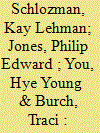

|
|
|
|
|
| Summary/Abstract |
This article documents the prevalence in organized interest politics in the United States of organizations—for example, corporations, think tanks, universities, or hospitals—that have no members in the ordinary sense and analyzes the consequences of that dominance for the democratic representation of citizen interests. We use data from the Washington Representatives Study, a longitudinal data base containing more than 33,000 organizations active in national politics in 1981, 1991, 2001, 2006, and 2011. The share of membership associations active in Washington has eroded over time until, in 2011, barely a quarter of the more than 14,000 organizations active in Washington in 2011 were membership associations, and less than half of those were membership association with individuals as members. In contrast, a majority of the politically involved organizations were memberless organizations, of which nearly two-thirds were corporations. The dominance of memberless organizations in pressure politics raises important questions about democratic representation. Studies of political representation by interest groups raise several concerns about democratic inequalities: the extent to which representation of interests by groups is unequal, the extent to which groups fail to represent their members equally, and the extent to which group members are unable to control their leaders. All of the dilemmas that arise when membership associations advocate in politics become even more intractable when organizations do not have members.
|
|
|
|
|
|
|
|
|
|
|
|
|
|
|
|
| 14 |
ID:
117540
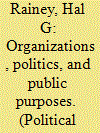

|
|
|
|
|
| Publication |
2012.
|
| Summary/Abstract |
The title of this lecture refers to organizations, politics, and public purposes to emphasize developments in the analysis of public organizations and their management and the need for that analysis to include politics as an influence on those organizations. The Gaus Award recognizes contributions in the joint tradition of public administration and political science. Organizations serve as essential components of the administrative branch of government and of virtually all other aspects of human life and many other forms of life. Social scientists that I call "organization theorists" have developed theory and research about organizations and the people in them. This body of work provides concepts and insights useful for the analysis of the organizations in government, which I call "public organizations." Organizations play crucial roles in the pursuit of values and goals shared by large aggregates of people. "Organizations, Politics, and Public Purposes: Analyzing Public Organizations and Public Management" refers to these shared values and goals as public purposes. Organizations are essential to public administration and we cannot effectively analyze organizations in public administration without concepts developed by political scientists; we need to draw on political science.
|
|
|
|
|
|
|
|
|
|
|
|
|
|
|
|
| 15 |
ID:
158432
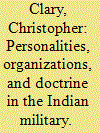

|
|
|
|
|
| Summary/Abstract |
The article explains when, why, and how Indian Army doctrine has changed since 1947. It traces Indian Army doctrinal evolution from defensive defense from 1947 to the mid-1960s, toward maneuver warfare after 1971, greater mechanization in the 1980s, and an emphasis on rapid, limited offensive strikes after 2002. It argues that in the absence of civilian intervention, the Indian Army has followed patterns predicted by organizational theory. The Indian Army has tended to avoid major doctrinal evolution and when doctrinal change has taken place it has consistently moved away from defensive orientations in favor of doctrines that maximize the initiative available to future Indian Army leaders to undertake offensive action. Doctrinal innovation has also been hampered by high turnover and apolitical selection of Indian Army chiefs, which inhibits continuity in efforts at doctrinal reform and modernization.
|
|
|
|
|
|
|
|
|
|
|
|
|
|
|
|
| 16 |
ID:
100271
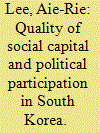

|
|
|
|
|
| Publication |
2010.
|
| Summary/Abstract |
Previous research claims that associational membership produces social capital. Employing the first wave of the Asian Barometer Survey conducted in 2003, this study investigates the development of social capital and its political consequences in South Korea. Rather than study simple association membership, I examine the quality of civil society (defined as associational commitment and interaction) that individuals pursue through membership. This, I believe, provides a close test of the theoretical impact of social interactions on political participation. The findings indicate that there is a positive association between voluntary activity and two modes of political activity (voting and campaign participation) in different ways and to varying degrees. Associational membership is a significant predictor of voting. In the case of the quality of social capital, associational interaction (talking politics with group members) turns out to be significant in encouraging participation in election campaigns. Overall, my findings on the role of social capital support Putnam's argument that group interactions foster democratic participation.
|
|
|
|
|
|
|
|
|
|
|
|
|
|
|
|
| 17 |
ID:
191028
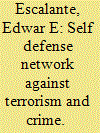

|
|
|
|
|
| Summary/Abstract |
According to prevailing evidence, self-enforcing agreements do not scale up. In self-governing societies, small groups are able to provide order and security when the group is small; but when groups are larger, collective action seems to be more efficient if undertaken by state-like institutions. However, an effective provision of national security may result from a bottom-up development of rules and institutions. This paper covers a case in which thousands of peasants built multicommunity partnerships that scaled up to produce public goods with no central direction. The organizational patterns of these peasant partnerships resulted in a vast rural movement that played a decisive role in defeating crime and terrorism in Peru between 1980 and 2000. The intergroup interactions reflected a polycentric order that served to discover the boundaries of the new jurisdictions.
|
|
|
|
|
|
|
|
|
|
|
|
|
|
|
|
| 18 |
ID:
082685
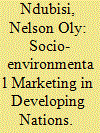

|
|
|
|
|
| Publication |
2008.
|
| Summary/Abstract |
Socio-environmental marketing practices have increased drastically in the last decade following the rising environmental consciousness worldwide. This research examines landscaping adoption by organizations in two developing countries in Asia and Africa (namely Malaysia and Nigeria), and the key dimensions of facilitators of adoption. Factor and discriminant analyses were conducted on the data collected from these organizations. The findings of the research are that economic climate, governmental intervention, competitive development, public scrutiny, favourable management attitude and intention, relative advantage, compatibility and ease of use are important factors of socio-environmental marketing adoption by the participating firms.
|
|
|
|
|
|
|
|
|
|
|
|
|
|
|
|
| 19 |
ID:
034066
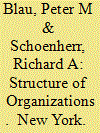

|
|
|
|
|
| Publication |
New York, Basic books Inc, Publishers, 1971.
|
| Description |
xix, 445pHbk
|
| Standard Number |
465082408
|
|
|
|
|
|
|
|
|
|
|
|
Copies: C:1/I:0,R:0,Q:0
Circulation
| Accession# | Call# | Current Location | Status | Policy | Location |
| 007415 | 658.1/BLA 007415 | Main | On Shelf | General | |
|
|
|
|
| 20 |
ID:
094135
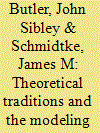

|
|
|
|
|
|
|
|